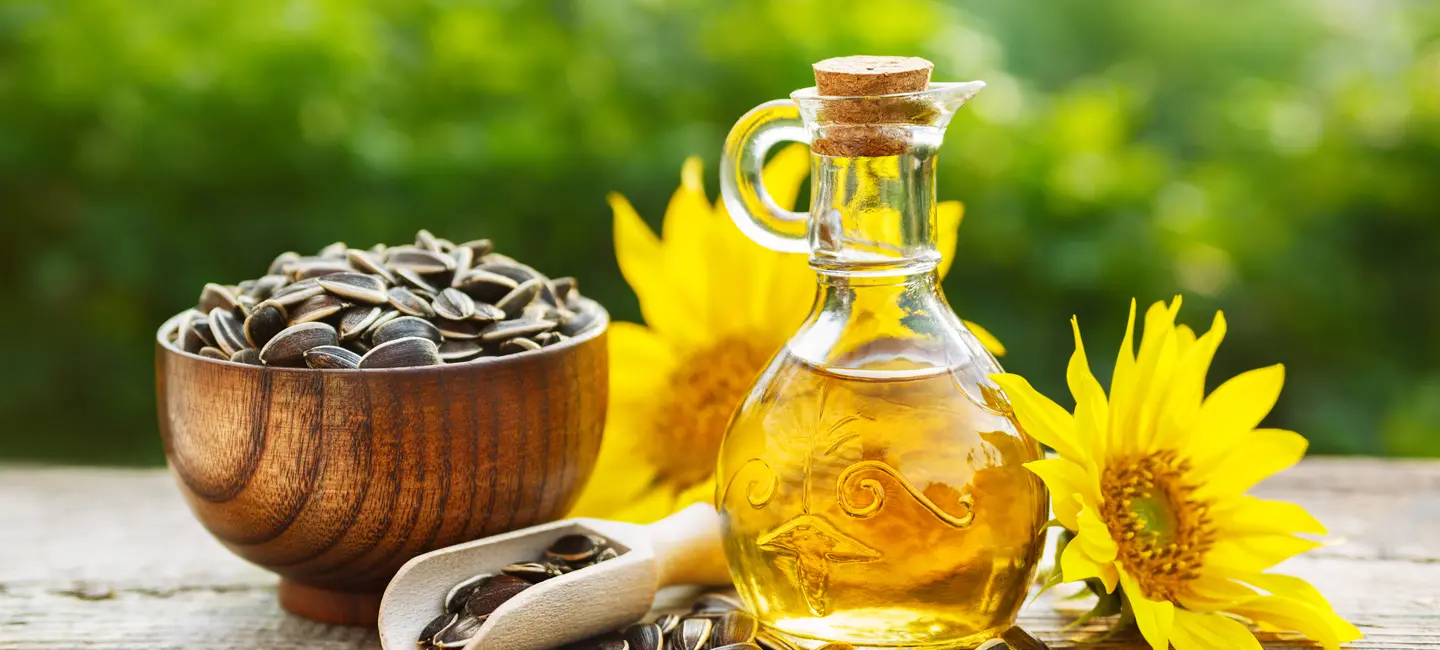
Sunflower oil is pressed from the seeds of the sunflower plant (Helianthus annuus). It contains high amounts of the essential fatty acid, linoleic acid.
Some sunflowers are grown to contain high amounts of oleic acid. Sunflower oil that comes from these plants is called high-oleic acid sunflower oil. It's used as a source of polyunsaturated fat in the diet.
People use sunflower oil for high cholesterol and preventing heart disease. It is also used for high blood pressure, eczema, dry mouth, dry skin, and many other conditions, but there is no good scientific evidence to support these uses.
Is It Effective?
NatMed Pro rates effectiveness based on scientific evidence according to the following scale: Effective, Likely Effective, Possibly Effective, Possibly Ineffective, Likely Ineffective, Ineffective, and Insufficient Evidence to Rate.
- Heart disease. Using high-oleic acid sunflower oil instead of other dietary fats and oils higher in saturated fat might reduce the risk for heart disease. The US FDA allows high-oleic acid sunflower oil products to make this claim on their product labels.
- High cholesterol. Consuming sunflower oil in the diet might reduce low-density lipoprotein (LDL or "bad") cholesterol levels in some people.
- High blood pressure. Taking sunflower oil by mouth doesn't seem to lower blood pressure in people with high blood pressure.
There is interest in using sunflower oil for a number of other purposes, but there isn't enough reliable information to say whether it might be helpful.
Is it Safe?
When taken by mouth: Sunflower oil is commonly consumed in foods.
When used as a mouth rinse: There isn't enough reliable information to know if sunflower oil is safe or what the side effects might be.
When applied to the skin: Sunflower oil is likely safe when used for up to 6 weeks.
Special Precautions & Warnings:
Pregnancy and breast-feeding: Sunflower oil is commonly consumed in foods. But there isn't enough reliable information to know if sunflower oil is safe to use in amounts greater than those found in food when pregnant or breast-feeding. Stay on the safe side and stick to food amounts.
Children: Sunflower oil is commonly consumed in foods. But there isn't enough reliable information to know if it is safe to take by mouth in larger amounts as medicine. Sunflower oil is possibly safe when applied to the skin for up to 2 months.
Allergy to ragweed and related plants: Sunflower oil may cause an allergic reaction in people who are sensitive to the Asteraceae/Compositae plant family. Members of this family include ragweed, chrysanthemums, marigolds, daisies, and many others.
Diabetes: A diet that is high in sunflower oil seems to increase fasting insulin and blood sugar levels. It also seems to increase after-meal blood fats. This might increase the chance of developing "hardening of the arteries" (atherosclerosis) in people with type 2 diabetes.
Medications for diabetes (Antidiabetes drugs)
Interaction Rating=Moderate Be cautious with this combination.
Sunflower oil might increase blood sugar levels. Taking sunflower oil along with diabetes medications might reduce the effects of these medications. Monitor your blood sugar closely.
There are no known interactions with herbs and supplements.
There are no known interactions with foods.
Sunflower oil is commonly consumed in foods. When it's used as a substitute for other dietary oils, it's recommended that adults consume 1.5 tablespoons of high-oleic acid sunflower oil daily.
As medicine, sunflower oil has been taken by mouth in varying doses. It's also been applied to the skin and used as a mouth rinse. Speak with a healthcare provider to find out what type of product and dose might be best for a specific condition.
Aceite de Girasol, Adityabhakta, Corona Solis, Fleurs de Soleil, Grand Soleil, Hélianthe, Hélianthe Annuel, Helianthi Annui Oleum, Helianthus annuus, Huile de Graines de Tournesol, Huile de Tournesol, Marigold of Peru, Sunflower, Sunflower Oils, Sunflower Seed Oil.
Information on this website is for informational use only and is not intended to replace professional medical advice, diagnosis, or treatment. While evidence-based, it is not guaranteed to be error-free and is not intended to meet any particular user’s needs or requirements or to cover all possible uses, safety concerns, interactions, outcomes, or adverse effects. Always check with your doctor or other medical professional before making healthcare decisions (including taking any medication) and do not delay or disregard seeking medical advice or treatment based on any information displayed on this website.
© TRC Healthcare 2024. All rights reserved. Use and/or distribution is permitted only pursuant to a valid license or other permission from TRC Healthcare.
